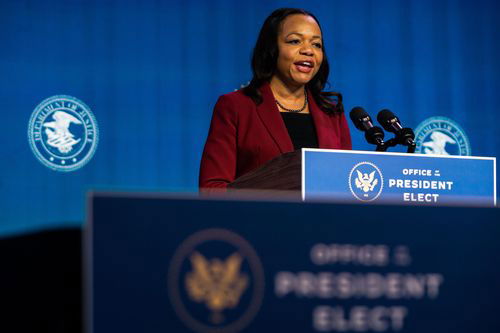Senate confirms Kristen Clarke as first Black woman to lead DOJ civil rights division

Democrats confirmed Kristen Clarke on Tuesday as the first Black woman to lead the Justice Department’s Civil Rights division, a historic step that came on the anniversary of George Floyd’s killing — and after a vitriolic campaign by Republicans over her stance on policing.
The vote was 51-48 with Sen. Susan Collins as the only Republican voting for her confirmation. Clarke’s confirmation breaks barriers in a department that was established in 1957.
She was ceremonially sworn in by Vice President Kamala Harris at the Justice Department on Tuesday evening. Harris spokesperson Symone Sanders praised Clarke as “a timeless champion of equal justice” in a statement before the ceremony.
“This is a historic moment because for the first time since its creation, following the enactment of the Civil Rights Act of 1957, the confirmed Assistant Attorney General for Civil Rights will be a woman, and will be a black woman, and that is Kristen Clarke,” Sanders said.
A first-generation born American whose parents emigrated from Jamaica, West Indies, Clarke earned degrees from Harvard University and Columbia University School of Law.
Her legal career began at the Justice Department which has allowed her to travel across the country into communities like Tensas Parish, Louisiana, and Clarksdale, Mississippi, she said at her confirmation hearing in April.
“Our nation is a healthier place when we respect the rights of all communities. In every role I’ve held, I have worked for and with people of all backgrounds — regardless of race, national origin, religion and disability status,” Clarke wrote. “I’ve listened deeply to all sides of debates, regardless of political affiliation. There is no substitute to listening and learning in this work, and I pledge to you that I will bring that to the role if confirmed.”
She has served for the past five years as the president of the nonprofit Lawyers’ Committee, which focuses on social justice.
After her nomination, Republicans resurfaced controversial moments going back as far as her undergraduate years at Harvard, where she co-authored an article that compared the genetics of Blacks and Whites and as the leader of Harvard’s Black Students’ Association where she invited an anti-Semitic author for a speaking engagement.
Clarke confronted both situations over 25 years ago, apologizing for giving the author a platform and explained after the article published that she did not share those views. But, after right-wing news outlets resurfaced the article to denounce her nomination, she has met with several Jewish organizations and reiterated to the Union of Reform Judaism that “she erred” in her decisions.
“Kristen has not only the skill set, but the temperament to handle all of that, she just let it slide off. This is someone who — even before the nomination — she received hate mail for suing the Proud Boys before the insurrection,” Damon Hewitt, the executive director and acting president of the Lawyers’ Committee for Civil Rights Under Law, told CNN.
After Clarke interned with the Justice Department in 1999, she turned down a position at a private law firm to work in public service, Hewitt said. Over Clarke’s 20-year career, she did three stints with federal civil rights teams and was an assistant counsel for the NAACP Legal Defense and Educational Fund — all while raising her son.
Contentious confirmation hearing
Republican Sens. Ted Cruz, Josh Hawley and Mitch McConnell refused to back Clarke’s nomination, citing her views on police reform.
“This is not the right nominee for a crucial post at a crucial time,” McConnell said on Monday, pointing to the recent rise in violent crime across the US.
Cruz used a recent hearing on untraceable firearms to criticize both Clark and Vanita Gupta, who was confirmed in April as associate attorney general — the first woman of color to fill the Justice Department’s No. 3 position — calling them “radicals.”
Hawley told CNN last week that he agreed with Cruz, saying “the pattern of nominees by this administration have a very sort of radical leftist background.”
Clarke defended her previous statements at her confirmation hearing last month, saying she’s against defunding the police and would rather allocate funds to other social programs.
“I do not support defunding the police,” she said at the hearing, in response to a question from Illinois Democratic Sen. Dick Durbin. “I do support finding strategies to ensure that law enforcement can carry out their jobs more safely and effectively and channeling resources to emotional health treatment and other severely under-resourced areas.”
Clarke’s supporters said they believe she faced a tougher path to confirmation because of her race.
“I think it’s race, there is no other way to describe it,” Derrick Johnson, the president of the NAACP, told CNN.
“No one else is being treated the way they are being treated in this moment,” Johnson added. “When you compare that to the appointments that the former administration presented, and how under qualified they were for the positions especially for lifetime appointments to the federal bench, you can’t draw any other conclusion but [that] it is racially motivated.”
In his remarks to CNN, Hawley denied that race played a role in his objections, saying that he found the suggestion “ridiculous and offensive.”
Cruz’s office said the Texas Republican’s objection stems from Clarke’s positions.
“Kristen Clarke’s brazen disdain for law enforcement — evidenced by her repeated calls to defund the police and her troubling history of advocacy on behalf of brutal cop killers — should be disqualifying to serve as Assistant Attorney General for the Civil Rights Division,” Cruz said in a statement to CNN.
This story and headline have been updated with additional developments Tuesday.